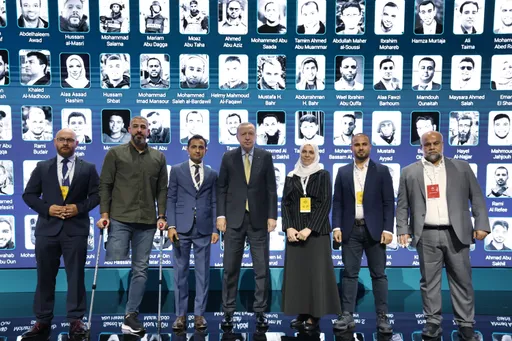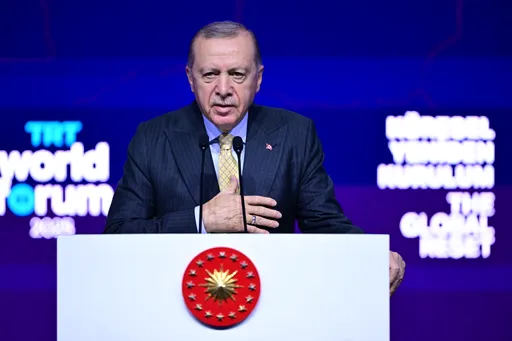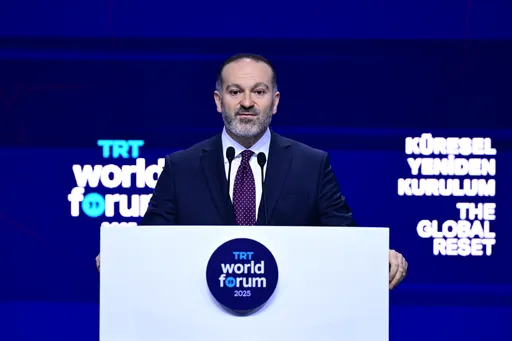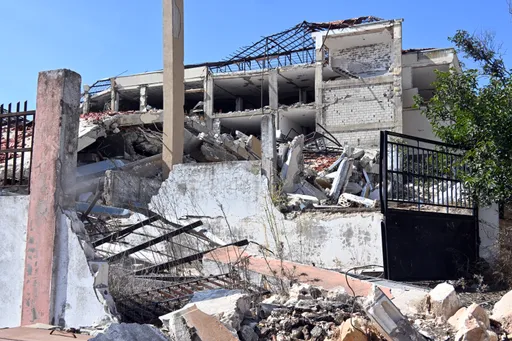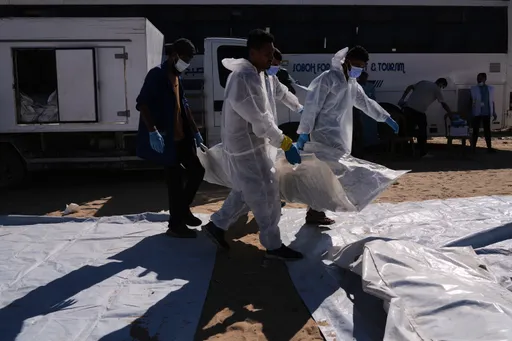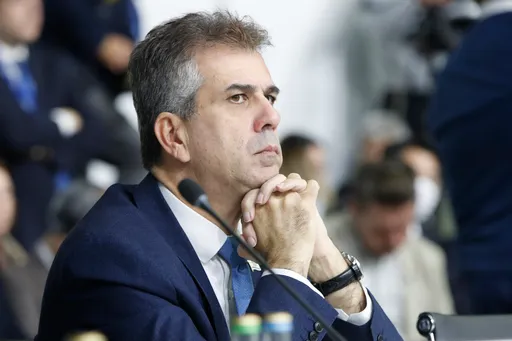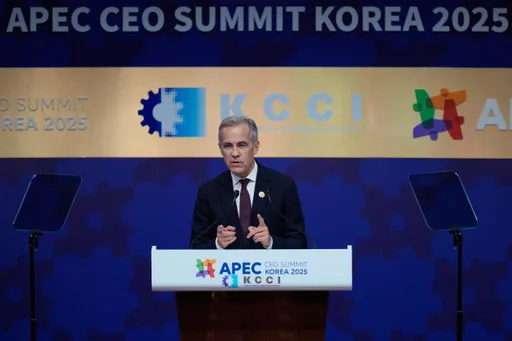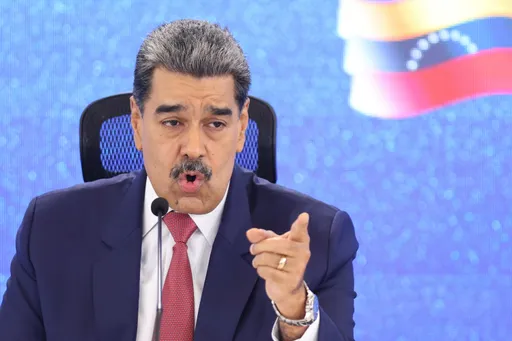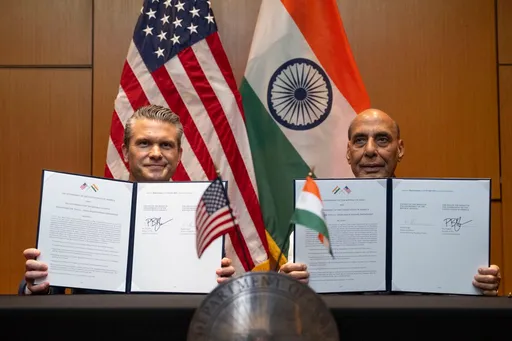Russian President Vladimir Putin has expressed "serious concern" over Ukraine's decision to impose martial law, the Kremlin said on Tuesday, after a confrontation at sea between the two countries.
Ukraine's parliament approved the introduction of martial law on Monday in the border regions of the country for 30 days, after Moscow seized three of Kiev's ships in a confrontation at sea.
In a phone conversation with Chancellor Angela Merkel, Putin said he hoped the German leader could intervene to rein in Kiev.
Putin "expressed a serious concern over Kiev's decision to put its armed forces on alert and to introduce martial law," the Kremlin said in a statement following the call.
He also said he hoped "Berlin could influence the Ukrainian authorities to dissuade them from further reckless acts," it added.
After intense debate on Monday, 276 Ukrainian lawmakers voted in favour of President Petro Poroshenko's request for the martial law. A minimum of 226 votes was required.
Poroshenko said it was necessary because of intelligence about "a highly serious threat of a ground operation against Ukraine." He did not elaborate.
"Martial law doesn't mean declaring a war," he said. "It is introduced with the sole purpose of boosting Ukraine's defence in the light of a growing aggression from Russia."
Ukraine's Defence Ministry already announced earlier in the day that its troops were on full combat alert in the country.
TRT World'sRuby Zaman reports.
US, NATO warn Russia
Also on Monday, US warned Russia that "outlaw actions" like the seizure of Ukrainian ships in the Sea of Azov are preventing normal relations from developing between Washington and Moscow.
US Ambassador Nikki Haley told an emergency meeting of the UN Security Council that "the United States would welcome a normal relationship with Russia. But illegal actions like this one continue to make that impossible."
TRT World's Frank Ucciardo has the details.
President Donald Trump said he did not like what was happening between Russia and Ukraine and was working with European leaders on the situation.
US Secretary of State Mike Pompeo called Russia's seizure of the Ukrainian vessels "a dangerous escalation and a violation of international law" and called for restraint from both countries.
"The United States condemns this aggressive Russian action. We call on Russia to return to Ukraine its vessels and detained crew members, and to respect Ukraine’s sovereignty and territorial integrity," Pompeo said in a statement.
TRT World speaks with Russian military expert John Jordan.
Tensions have flared after the Russian navy on Sunday boarded and seized three Ukrainian ships off the coast of Crimea, accusing Ukraine of illegally entering Russian waters in the Sea of Azov.
The confrontation at sea raised fears of a wider military flareup.
Haley put the blame firmly on Russia for the clash, calling the seizure of the ships an "outrageous violation of sovereign Ukrainian territory" and slamming "yet another reckless Russian escalation."
But she did not specifically threaten further sanctions, instead of calling for a de-escalation of tensions over Crimea.
Russia denies 'mythical' aggression
Russia's envoy accused Ukraine of provoking the confrontation to justify the imposition of martial law and a delay of elections as polls show Ukrainian President Poroshenko faces possible defeat.
Denouncing a "mythical Russian aggression," Russian Deputy Ambassador Dmitry Polyanskiy told the council: "Our country has never caused the first blow, but it knows how to protect itself."
NATO chief Jens Stoltenberg also demanded Russia free Ukrainian ships and sailors, warning Moscow that "its actions have consequences".
Stoltenberg held phone talks with Ukrainian's Poroshenko before officials from the two sides held emergency talks at alliance headquarters in Brussels.
"There is no justification for the use of military force against Ukrainian ships and naval personnel, so we call on Russia to release immediately the Ukrainian sailors and ships it seized yesterday," Stoltenberg told reporters after the meeting of the NATO-Ukraine Commission.
Tensions have been building over the Kerch Strait, where Russia has built a new bridge that gives it a land connection to Crimea.
Moscow confirms seizure
On Monday, Russia confirmed it seized three Ukrainian naval vessels off the coast of Moscow-controlled Crimea and admitted to using force.
Russia's Federal Security Service, known as the FSB said it fired on the vessels to force them to stop, and then seized them.
Russia says acted 'strictly' within international law
Ukraine said six of its soldiers were injured, while the FSB reported only three had suffered non-life threatening injuries and were given medical treatment.
Later, a statement by Kremlin said the vessels intruded into Russian territorial waters and that they did not respond to attempts to contact them by Russian border guards.
The statement said Russia's seizure of three Ukrainian vessels in Kerch strait was in strict accordance with international and domestic law.
TRT World'sLucy Taylor has more.
EU 'united in support of Ukraine'
European Council President Donald Tusk on Monday condemned Russia's seizure of Ukrainian navy vessels.
"I condemn Russian use of force in the Azov Sea. Russian authorities must return Ukrainian sailors, vessels and refrain from further provocations," Tusk said after a phone call with Poroshenko.
"Europe will stay united in support of Ukraine."
UK condemns Russia
Britain condemned Russia on Monday, saying the incident provided further evidence of Moscow's destabilising behaviour.
"We condemn Russia's act of aggression ... This incident provides further evidence of Russia's destabilising behaviour in the region," Prime Minister Theresa May's spokesman told reporters.
"The UK position is clear, ships must be allowed free passage to Ukrainian ports in the sea of Azov. We urge all parties to act with restraint. Russia must not be allowed to use force to exert greater pressure on Ukraine."
British Foreign Secretary Jeremy Hunt tweeted that the incident showed Russians "contempt for international norms andUkrainian sovereignty".
Blame game
Russia blamed Ukraine for provoking the incident, which sharply escalated tensions that have been growing between the two countries since Moscow annexed Crimea from Ukraine in 2014, and it has worked steadily to bolster its zone of control around the peninsula.
The Ukrainian navy said two of its gunboats were struck and Russian crews boarded and seized them and an accompanying tugboat.
The EU and NATO called for restraint from both sides and for Moscow to restore access to the strait, which Ukraine uses to move ships to and from ports on either side of the peninsula.
German Foreign Minister Heiko Maas on Monday called a Russian blockade of access to the Sea of Azov "unacceptable" and urged an easing of tensions with Ukraine following a weekend flare-up.
"The developments are troubling," he tweeted.
"A Russian blockade of the passage to the Sea of Azov is unacceptable. It is important that the blockade be lifted. We call on both sides to deescalate."
Allegations
Ukrainian authorities said they had given advance notice to the Russians that the vessels would be moving through the strait, which connects the Black Sea to the Sea of Azov.
Russia said the three Ukrainian vessels made an unauthorised passage through Russian territorial waters, while Ukraine alleged that one of its boats was rammed by a Russian coast guard vessel.
The tugboat, which was rammed, was traveling with the two Ukrainian gunboats from Odessa on the Black Sea to Mariupol, an eastern Ukraine port, via the Kerch Strait.
"Russian coast guard vessels ... carried out openly aggressive actions against Ukrainian navy ships," the Ukrainian statement said, with the tugboat suffering damage to its engine, hull, side railing and a lifeboat.
TRT World speaks with journalist Volodymyr Solohub.
Blocking the strait
The Kerch Strait is the only passage into the Sea of Azov. The strait is spanned by the recently completed Kerch Bridge, connecting Crimea to Russia. Transit under the bridge has been blocked by a tanker ship, and dozens of cargo ships awaiting passage are stuck.
Russia has not given any indication of how long it will block the strait, but a long-term closure to would amount to an economic blockade of Ukrainian cities on the Azov coast. Russia's Black Sea Fleet greatly outmatches the Ukrainian navy.
Ukrainian ports on the Sea of Azov include strategically vital centres such as Mariupol, the closest government-controlled city to Donetsk and Luhansk, the breakaway regions of eastern Ukraine controlled by Russia-backed separatists. Thousands of people in those regions have been killed in fighting between Ukrainian troops and the separatists since 2014.

A National Guard serviceman extinguishes a torch thrown by a protester during a rally against the seizure by Russian special forces of three of the Ukrainian navy ships, which Russia blocked from passing through the Kerch Strait into the Sea of Azov in the Black Sea, in front of the Russian embassy in Kiev, Ukraine, November 25, 2018. (Reuters)
The FSB told Russian news agencies after the first incident that the Ukrainian ships held their course and violated Russian territorial waters.
"Their goal is clear — to create a conflict situation in the region," the FSB statement said. It did not mention that a Ukrainian tugboat was rammed.
Although a 2003 treaty designates the Kerch Strait and Sea of Azov as shared territorial waters, Russia has been asserting greater control over the passage since 2015.
The Ukrainian Foreign Ministry said earlier that Russia's actions violated the UN Charter and international law, and pledged to "promptly inform our partners about Russia's aggressive actions."
"Such actions pose a threat to the security of all states in the Black Sea region," the statement said, "and therefore require a clear response from the international community."






